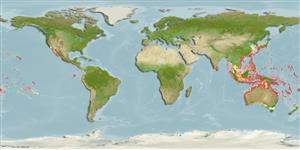>
Eupercaria/misc (Various families in series Eupercaria) >
Labridae (Wrasses) > Corinae
Etymology: Coris: Greek, kore, -es = pupil and also with themenaing of "maid" (Ref. 45335).
More on author: Fowler.
Environment: milieu / climate zone / depth range / distribution range
Ecologia
marino associati a barriera corallina; distribuzione batimetrica 2 - 40 m (Ref. 37816). Tropical
Western Pacific: Sagami Bay, Honshu south to Victoria, Australia and New Caledonia and east to Tonga.
Size / Peso / Age
Maturity: Lm ? range ? - ? cm
Max length : 38.0 cm TL maschio/sesso non determinato; (Ref. 90102)
Spine dorsali (totale): 9; Raggi dorsali molli (totale): 12; Spine anali 3; Raggi anali molli: 12. Body greenish with pink longitudinal lines and white barring (Ref. 48636). Body greenish with several red stripes breaking into spots posteriorly and about 8 thin vertical pale bars. A black spot rimmed with yellow on posterior margin of opercle. A black spot at posterior basal portion of dorsal fin. First 2 dorsal-fin spines with flexible tips slightly longer than other dorsal-fin spines (Ref 9823).
Found in coastal to outer reef habitats in deep gutters or along reef margins (Ref. 48636). Inhabits rocky and coral reefs, in areas with rubble, weed and sand (Ref. 9710). Found solitary (Ref. 90102).
Life cycle and mating behavior
Maturità | Riproduzione | Deposizione | Uova | Fecundity | Larve
Oviparous, with distinct pairing during breeding (Ref. 205).
Randall, J.E., 1999. Revision of the Indo-Pacific labrid fishes of the genus Coris, with descriptions of five new species. Indo-Pac. Fish. (29):74 p. (Ref. 33411)
IUCN Red List Status (Ref. 130435)
Threat to humans
Harmless
Human uses
Acquario: Commerciale
Informazioni ulteriori
BibliografiaAcquacolturaProfilo di acquacolturaVarietàGeneticaElectrophoresesEreditarietàMalattieElaborazioneNutrientsMass conversion
CollaboratoriImmaginiStamps, Coins Misc.SuoniCiguateraVelocitàModalità di nuotoArea branchialeOtolithsCervelliVista
Strumenti
Special reports
Download XML
Fonti Internet
Estimates based on models
Preferred temperature (Ref.
123201): 22.4 - 28.9, mean 27.5 °C (based on 532 cells).
Phylogenetic diversity index (Ref.
82804): PD
50 = 0.5000 [Uniqueness, from 0.5 = low to 2.0 = high].
Bayesian length-weight: a=0.00977 (0.00470 - 0.02030), b=3.07 (2.89 - 3.25), in cm total length, based on LWR estimates for this (Sub)family-body shape (Ref.
93245).
Trophic level (Ref.
69278): 3.5 ±0.3 se; based on size and trophs of closest relatives
Resilienza (Ref.
120179): Medio, tempo minimo di raddoppiamento della popolazione 1.4 - 4.4 anni (Preliminary K or Fecundity.).
Fishing Vulnerability (Ref.
59153): Low to moderate vulnerability (28 of 100).
Nutrients (Ref.
124155): Calcium = 37.2 [14.6, 100.6] mg/100g; Iron = 0.558 [0.333, 0.989] mg/100g; Protein = 18.6 [15.7, 20.8] %; Omega3 = 0.127 [0.064, 0.249] g/100g; Selenium = 32 [12, 89] μg/100g; VitaminA = 102 [33, 353] μg/100g; Zinc = 1.87 [0.88, 3.36] mg/100g (wet weight);
